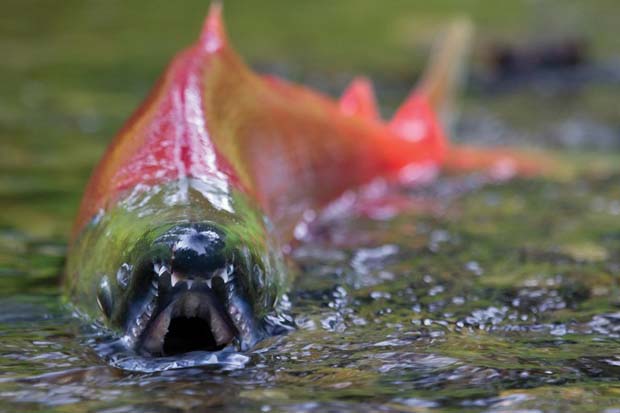
Daniel Schindler shown here with his daughter Luna looking at some sockeye salmon on the spawn route. Image by Jonny Armstrong.
The world’s longest ongoing salmon research reveals the astounding complexity of wild ecosystems
Wood-Tikchik State Park, Alaska
[dropcap]W[/dropcap]hen Daniel Schindler was 6 months old, his parents took him on an adventure: They moved into a tent at a research camp in the Canadian backwoods, surrounded by dozens of lakes. His father, limnologist David Schindler, was measuring how those lakes were harmed by phosphate detergent runoff and acid rain; the work he did would help lead to the reduction of those pollutants across North America. The family spent four months at the camp every year, abandoning tents for cabins once they were built. Young Schindler did a lot of fishing and swimming, and around age 14 he got interested in the science.
Now, 44 years after that first adventure started, Schindler has become the kind of scientist who can pilot a 90-horsepower jetboat across a huge lake and into a shallow meandering river, goosing the throttle while standing up to read the riffles ahead of him, zooming from bank to bank, finding the least-risky course through barely submerged rocks and snags as the waves buck the boat into the air and a cold rain pelts him the whole way.
I saw Schindler enjoying this experience in August, when I visited his research camp here on Lake Nerka, in southwestern Alaska, in an area managed as Wood-Tikchik State Park and Togiak National Wildlife Refuge. The camp is a cluster of cabins far off the grid, reachable only by boat or floatplane. The landscape feels prehistoric – more than 6 million acres of wilderness with hundreds of streams and lakes. Lush peaks, never entirely snow-free, rise steeply from the shores. It’s the kind of natural setting that encourages you to breathe in more deeply than usual.
Schindler makes his living as a professor of aquatic and fish sciences at the University of Washington in Seattle, but he still embraces the rhythm of his childhood; this was the 17th summer he’s spent researching this nearly pristine Alaska ecosystem. Reflecting on the path he’s taken, he said, “I like being outdoors. I wanted an interesting life.”
To read complete story click here […]


